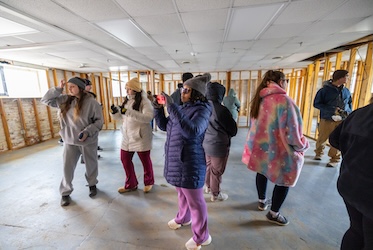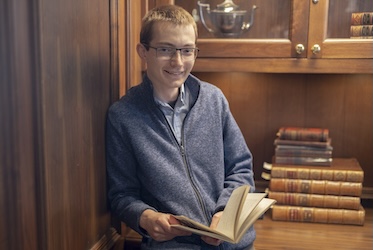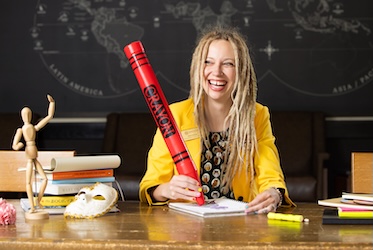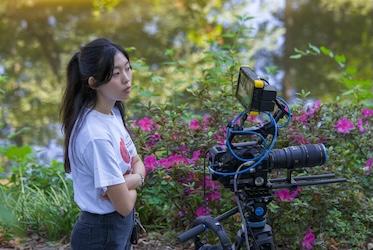
Kennesaw State OwlSwap tackling sustainability education one clothing choice at a time
KENNESAW, Ga. | Apr 22, 2022
Born from a Kennesaw State University classroom discussion in 2018, OwlSwap’s student and faculty leaders work hard to spread awareness of how the recycling of clothing can have a positive impact on the environment.

This Earth Day, OwlSwap Director Britt Pickering, a sociology alumnus, said what may seem like a big problem with no solution starts with one person at a time.
“Clothing has one of the biggest impacts on the planet from its production to the end of its useful life, and it’s a tangible issue for students to make a difference,” Pickering said. “We all wear clothing every day, so we can all make choices that help reduce our carbon emissions and water usage.”
In clothing production, massive amounts of water and harsh chemicals are used to fade jeans or style shirts, and those chemicals or microplastics often pollute water supplies around the world when the clothing is washed and materials like acrylic and polyester break down. In some cases, the pollution can lead to increased cancer rates and other problems, Pickering said.
Through recycling clothing, Pickering estimates, OwlSwap participants have reduced the amount of clean water needed to make new clothing by millions of gallons by reducing the demand for new clothes. OwlSwap has given out about 17,000 articles of clothing to students, for a savings of $82,000 over the cost of buying new items, she said.
Secondhand clothing also results in reducing abusive labor practices in some developing nations where clothing is manufactured, Pickering said.

OwlSwap, a program of the Department of Geography and Anthropology, hosts sustainability education events on both KSU campuses, including clothing swaps, class lectures and basic mending workshops, and offers three free closet locations across the campuses.
“Consumers really have the power to be voting with their dollar — choosing where to purchase,” Pickering said. “Students love getting on Instagram and calling brands out to be more sustainable and ethical, and we’ve seen that work.”
OwlSwap also has community partners, like re:loom, a Decatur nonprofit that combats homelessness through repurposing of clothing and other textiles. Through that partnership, surplus clothing from KSU is disassembled and reworked into new items that are sold to support housing and job training programs.
Maria Anastasi, a senior exercise science major, has attended most OwlSwap events since 2019. She said OwlSwap is a great free resource for students, and it’s addressing a global problem at a local level.
“I think it’s important because we have a responsibility to each other as global citizens to be ethical toward each other,” Anastasi said.
Radha Patel, a senior political science major, has worked for OwlSwap since 2020. As program coordinator, Patel handles the clothing swaps and collects data, including tracking inventory and distribution of clothing. That data is used in an end-of-year report to show the impact OwlSwap has made, for example, in amount of water saved by cutting down on clothing waste.

Since joining OwlSwap, Patel says, sustainability has become a major part of her academic and career interest.
“I try to use less plastic, and I try to only shop secondhand and at the OwlSwap closets. It’s made me realize how much one small change can make in the larger picture,” Patel said.
– Thomas Hartwell
Related Stories

Kennesaw State architecture, engineering students reimagine Asheville's devastated River Arts District

First-year Kennesaw State student, author recognized as versed local historian

Kennesaw State student leverages Double Owl Pathways program to accelerate career path

Kennesaw State student uplifts community through film work, fellowship
A leader in innovative teaching and learning, Kennesaw State University offers undergraduate, graduate, and doctoral degrees to its more than 47,000 students. Kennesaw State is a member of the University System of Georgia with 11 academic colleges. The university’s vibrant campus culture, diverse population, strong global ties, and entrepreneurial spirit draw students from throughout the country and the world. Kennesaw State is a Carnegie-designated doctoral research institution (R2), placing it among an elite group of only 8 percent of U.S. colleges and universities with an R1 or R2 status. For more information, visit kennesaw.edu.














